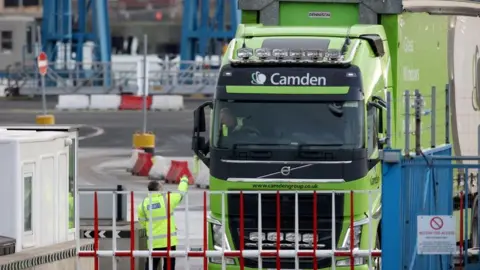NI Protocol: Economic output may grow but prices could be higher
 PAUL FAITH
PAUL FAITHThe protocol could see the output of the Northern Ireland economy increase but leave consumers facing higher prices, new analysis suggests.
That is compared to a scenario where Brexit had not occurred.
The economic modelling was carried out by trade experts from the University of Sussex.
It was commissioned by Stormont's Department for the Economy last year but has only recently been published.
The protocol is the Brexit deal which prevents a hard Irish border by keeping Northern Ireland inside the EU's single market for goods.
That means that goods can flow freely between the Republic of Ireland and Northern Ireland, removing the threat of a "hard border".
However, goods arriving into Northern Ireland from the rest of the UK are now subject to checks and controls - amounting to what is referred to as an "Irish Sea border".
The economic modelling suggests the impact of the protocol will see the output of the NI economy rise by 2.2% compared to no Brexit.
That is due to Northern Ireland manufacturers maintaining preferential access to both the EU and UK markets and also because the sea border means Northern Ireland producers will face less competition from Great Britain.
There is a wide variation in impacts across sectors, with parts of the service sector suffering from loss of preferential access to the EU single market, reflecting the fact that the protocol only covers trade in goods.

Consumer price rises
However, the increased trade barriers for GB goods means that consumer prices will rise by an estimated 4.3% compared to no Brexit, reducing overall economic welfare by about 2.4%.
The authors conclude: "Given the close economic relationship between NI and GB any increase in trade barriers has potentially significant impacts.
"Some industries, and firms within those industries, and consequently workers in those industries may benefit from the increase in import barriers (GB to NI).
"Others sectors, firms within those sectors, and workers in those firms, will see negative effects because of the impact on their costs and sales and ultimately production.
"Consumers in general will lose out from the increases in prices."
'Not forecasts or predictions'
The authors give the usual caveats that economic modelling involves making certain assumptions and is based on imperfect data.
They say: "The simulations in this report are not forecasts or predictions. They are simulations which help to identify the direction of possible changes, the relative orders of magnitude of those changes, and the mechanisms driving those changes."
The study contains a lengthy explanation of the modelling methodology.
The results of this study are not dissimilar from another modelling exercise carried out by the Fraser of Allander Institute (FAI) at Strathclyde University.
It found that the protocol could leave Northern Ireland's economy 2.6% smaller compared with a scenario in which the UK stayed in the EU.
Negotiations are ongoing between the UK and EU to change aspects of the protocol.
